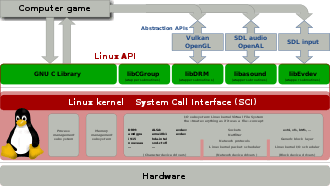libusb
libusb is a library that provides applications with access for controlling data transfer to and from USB devices on Unix and non-Unix systems, without the need for kernel-mode drivers.
| Initial release | 2007[1] |
|---|---|
| Stable release | 1.0.23[2]
/ August 28, 2019 |
| Repository | github |
| Written in | C |
| Type |
|
| License | LGPL 2.1 |
| Website | libusb |

The Linux API is composed out of the System Call Interface of the Linux kernel, the GNU C Library, libcgroup,[3] libdrm, libalsa and libevdev[4] (by freedesktop.org).
Rationale
Because the Linux kernel is a monolithic type of kernel, device drivers are part of it.
Availability
libusb is currently available for Linux, the BSDs, Solaris, OS X, Windows, Android, and Haiku[5]. It is written in C.
Amongst other applications, the library is used by SANE, the Linux scanner project, in preference to the kernel scanner module, which is restricted to Linux kernel 2.4.
gollark: What do you mean?
gollark: Yes.
gollark: Whom?
gollark: What about 40Gbps links for people's home data centres?
gollark: Would a WiFi cable just be a waveguide?
See also
- Linux API
- udev
- Video4Linux
References
This article is issued from Wikipedia. The text is licensed under Creative Commons - Attribution - Sharealike. Additional terms may apply for the media files.